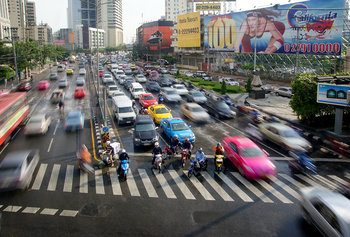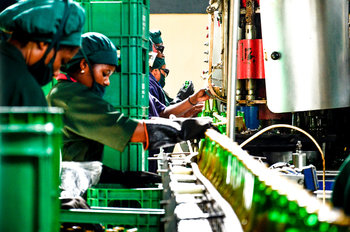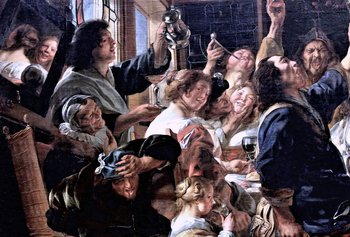
Quality of Life
Socialism is concerned with the interests of labor and may view the poor in an unfavorable light as lumpenproletariat. Democratic socialism tends to be more sympathetic to the poor with the view that a rich society should automatically provide a minimum quality of life to all. However, in some cases democratic socialists remain heavily aligned to unions and the interests of organized labor.Dominance
All developed nations can currently be described as somewhat democratic socialist whereby they can't be described as purely capitalist because they use taxation and regulations to achieve social aims such as reduction of poverty and pollution. Where true socialism has never successfully lead to a fully developed nation, the pragmatic tact of democratic socialism has influenced all developed nations.Capitalism
Democratic socialist societies are based on a capitalist model of value creation. Socialist models such as public firms exist at the periphery of democratic socialist economies whereby they create some value in an economy that is overwhelmingly capitalist.Taxation
Democratic socialists advocate high taxes that are progressive such that the upper class pay more in principle. In practice, the rich may have the means to escape heavy taxation with aggressive tax structures and strategies. In this case, a heavy tax burden may be placed on the middle class and working class.Adversarial System
Democratic socialists tend to have an antagonistic relationship with large capitalist firms. This is perhaps healthy as the government can serve to moderate the excesses of large corporations.Regulations
Regulations that seek to reduce economic bads such as pollution or to protect workers and consumers.Public Ownership
Public ownership of natural monopolies and critical infrastructure such as utilities, telecoms, roads and transportation services. These are sectors where it can actually make sense for the government to own firms as compared to the questionable practice of granting a monopoly to private interests that would be likely to engage in rent seeking behavior. Democratic socialists may go beyond natural monopolies and critical infrastructure to advocate public firms competing with the private sector. This can resemble cronyism whereby the government interferes in markets to benefit friends and allies.Public Services
Democratic socialism is best known for providing free or low cost public services that may increase the competitiveness and quality of life of a nation. For example, public education, healthcare and housing.Paternalism
Strangely, democratic socialists are often incorrectly presented as liberals when in fact they tend towards paternalism and the view that people have little agency such that the government plays a role in regulating every aspect of life. This runs contrary to true liberalism that prioritizes freedom.Progressives
Democratic socialists are typically progressives who believe in aggressive change.Sustainability
The view that the environment is a massively valuable public asset that is not to be mismanaged. Communism has a poor environmental record. Democratic socialists tend to advocate for environmental responsible policy but historically this didn't appear to be much of a priority.Socialism
Democratic socialists may view fully socialism or market socialism as an admirable long term plan. In practice, they may do little to move a society in this direction. They tend to focus on taxation, regulations and public services as a means of making things more equal and fair without going so far as eliminating competition and individual freedoms in order to force universal sameness.Capitalist Realism
In practice, democratic socialists may embrace capitalist realism, the observation that capitalism produces superior efficiency, productivity and innovation such that it has no realistic alternatives. This would call for the pragmatic tact of using capitalism as an engine that can be shaped to achieve social good.Democratic Socialism vs Market Socialism
Democratic socialism is the pursuit of socialist goals in a democratic setting with competition with other political ideologies. This tends to be pragmatic whereby socialist gains such as public services are won in a society that is primarily capitalist. This is extremely common such that democratic socialism has greatly influenced all developed nations.Market socialism is socialism that allows for economic competition. This isn't necessarily democratic and specifically isn't capitalist. Market socialism requires that either the government and/or employees own all firms. This is mostly hypothetical and academic.Notes
In common parlance, the term socialism often refers to democratic socialism. For example, advocacy of government provided education and healthcare may be described as a socialist position.In an academic context, the term democratic socialism is often used to describe hypothetical systems such as a full socialist society that has somehow emerged in a democratic system.Democratic socialism may also be used to describe specific political parties that may markedly differ from the characteristics above.| Overview: Democratic Socialism | ||
Type | ||
Definition (1) | The pragmatic advocacy for the working class and poor in a democratic society with competition between political ideologies. | |
Definition (2) | A hypothetical type of society based on both socialism and democratic rights and freedoms. | |
Related Concepts | ||




































